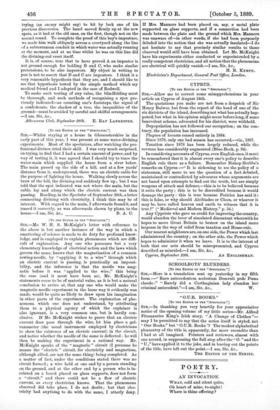[To THE EDITOR OF THE " SPECTATOR."
SIR,—Mr. W. H. S. McKnight's letter with reference to the above is but another instance of the way in which a smattering of science is made to do duty for profound know- ledge, and is employed to explain phenomena which are diffi- cult of explanation. Any one who possesses but a very elementary knowledge of electrical action and the laws which govern the same, knows that the magnetisation of a common sewing-needle, by "applying it to a wire" through which an electric current is passing, is practically an impossi- bility, and the inference is that the needle was mag- netic before it was " applied to the wire;" this being the case (and it must have been so), Mr. McKnight's statements cease to be of material value, as it is but a natural conclusion to arrive at, that any one who would make the magnetic needle experiment in the loose way it evidently was made, would be quite as likely to draw upon his imagination in other parts of the experiment. The explanation of phe- nomena which one does not understand, by attributing them to a physical agency of which the explainer is also ignorant, is a very common one, but is hardly con- clusive. If Mr. McKnight wishes to prove that an electric current does pass through the wire, let him place a gal- vanometer (the usual instrument employed by electricians to show the existence of an electric current) in the circuit, and notice whether the needle of the same is deflected : be will then be making the experiment in a rational way. Mr. McKnight speaks of the " magnetic " circuit (I presume he means the " electric " circuit, for electricity and magnetism, although allied, are not the same thing) being completed. As a matter of fact, under the conditions stated there was no circuit formed ; a wire held at one end by a person standing on the ground, and at the other end by a person who is in- sulated on a board placed on glass supports, does not form a "circuit," and there could not be a flow of electric current, as every electrician knows. That the phenomena observed did take place, I do not doubt ; but that elec- tricity had anything to do with the same, I utterly deny. If Mrs. Manners had been placed on, say, a metal plate supported on glass supports, and if a connection had been made between the plate and the ground which Mrs. Manners was unaware of—in other words, if she had been purposely deluded into the notion that she was actually insulated—I do not hesitate to say that precisely similar results to those observed would still have been obtained. Let Mr. McKnight have his experiments either conducted or superintended by a really competent electrician, and all notion that the phenomena. are electrical will quickly vanish.—I am, Sir, &c., H. R. HEXPE.
Electrician's Department, General Post Office, London.






































 Previous page
Previous page